Nubia Red Magic Nova Tablet review: a rapid but somewhat unrefined gaming tablet
Nubia Red Magic Nova Tablet review: Two-minute review
Not content with all but cornering the market in affordable gaming phones, Nubia has now turned its attention to addressing an even more niche market: that of the gaming tablet.
Following the limited launch of the Red Magic Tablet in 2023, the Red Magic Nova Tablet stands as Nubia’s first globally available gaming tablet, and is positioned as a full-sized tablet with top-level gaming performance at a mid-market price.
The Nova largely delivers on that promise, offering a level of gaming performance that punches well above its weight. This machine flies through high-end games on top settings, and although its 10.9-inch 144Hz IPS LCD isn’t the best screen on the market, it is able to keep up with the tablet’s monstrous Snapdragon 8 Gen 3 Leading Version processor. That’s good news for any games that can hit 120fps or higher.
There is the slight sense that Nubia hasn’t quite thought this whole gaming tablet thing through, though. For example, you have to suspect that committed gamers will be pairing up a Bluetooth controller, so a kickstand or a bundled-in case with a stand would have been useful.
Elsewhere, while performance is extremely impressive, our gaming benchmarks suggest that the Nova Tablet isn’t quite as stable across extended intensive sessions as you might hope. It’s nothing to worry about with today’s most advanced games, though, where everything flies.
Meanwhile, Nubia’s custom UI continues to need work, though Game Space remains a solid way to tweak and optimize your gaming experience.
All in all, the Red Magic Nova Tablet comes across as an extremely capable, keenly priced tablet that perhaps hasn’t yet reached its final form. Those looking for the best tablet performance for less than $500/ £500 should definitely consider it, and we’re excited to see how Nubia’s Red Magic sub-brand refines and develops its gaming tablet vision in future products.
Nubia Red Magic Nova Tablet review: price and availability
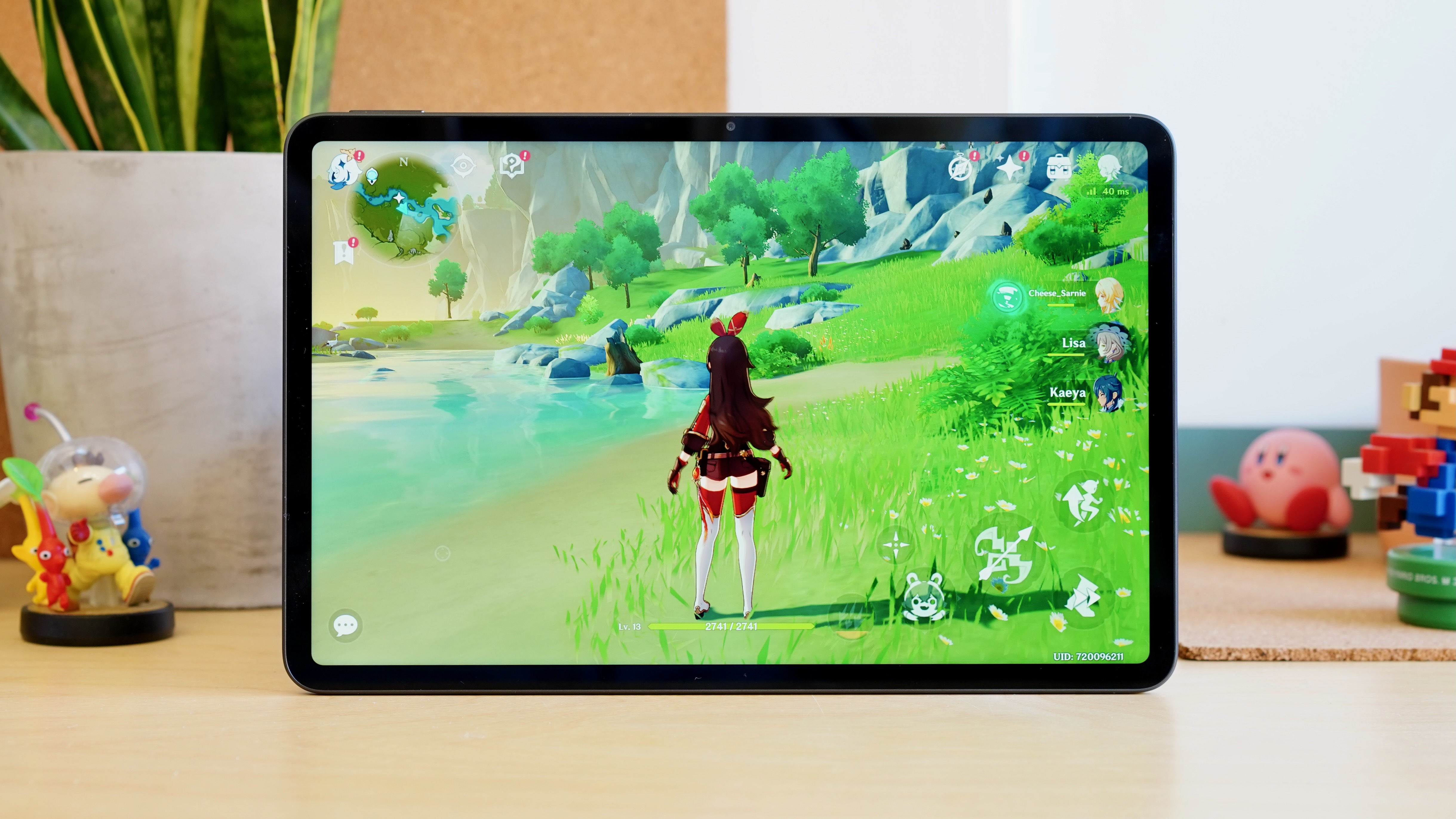
- From $499/ £439
- Open availability from October 16, 2024
The Nubia Red Magic Nova Tablet went on sale on October 16, 2024, though at the time of writing, stock has run out due to high demand, and the device is listed as being available to pre-order on Red Magic's official website. Red Magic has, however, told TechRadar that stock will be replenished in November.
Nubia’s Red Magic sub-brand has always supplied outstanding value for money, and that continues to be the case with its first global gaming tablet. Pricing starts from just $499/£439 for the model with 12GB of RAM and 256GB of storage.
There’s also a second, more premium model with 16GB of RAM and 512GB of storage available for $649 / £559.
You won’t find another Android-based tablet with this level of performance for such a low price. The OnePlus Pad 2 gets closest, offering the same Snapdragon 8 Gen 3 chipset and a similarly swift 144Hz display at a price of £499.
The Samsung Galaxy Tab S9 FE gets closer to the Red Magic on price, starting from £449. However, it doesn’t even approach the Nova Tablet on raw performance.
It’s possible to buy a tablet that outstrips the Red Magic Nova Tablet for raw performance, but you’ll need to switch over to team Apple to do so. Even then, the mighty M2-powered iPad Air, which starts from $599 / £599, sports a puny 60Hz display, and lacks the Red Magic’s meaty cooling system for sustained gaming.
- Value score: 5/5
Nubia Red Magic Nova Tablet review: specs
Nubia Red Magic Nova Tablet review: design
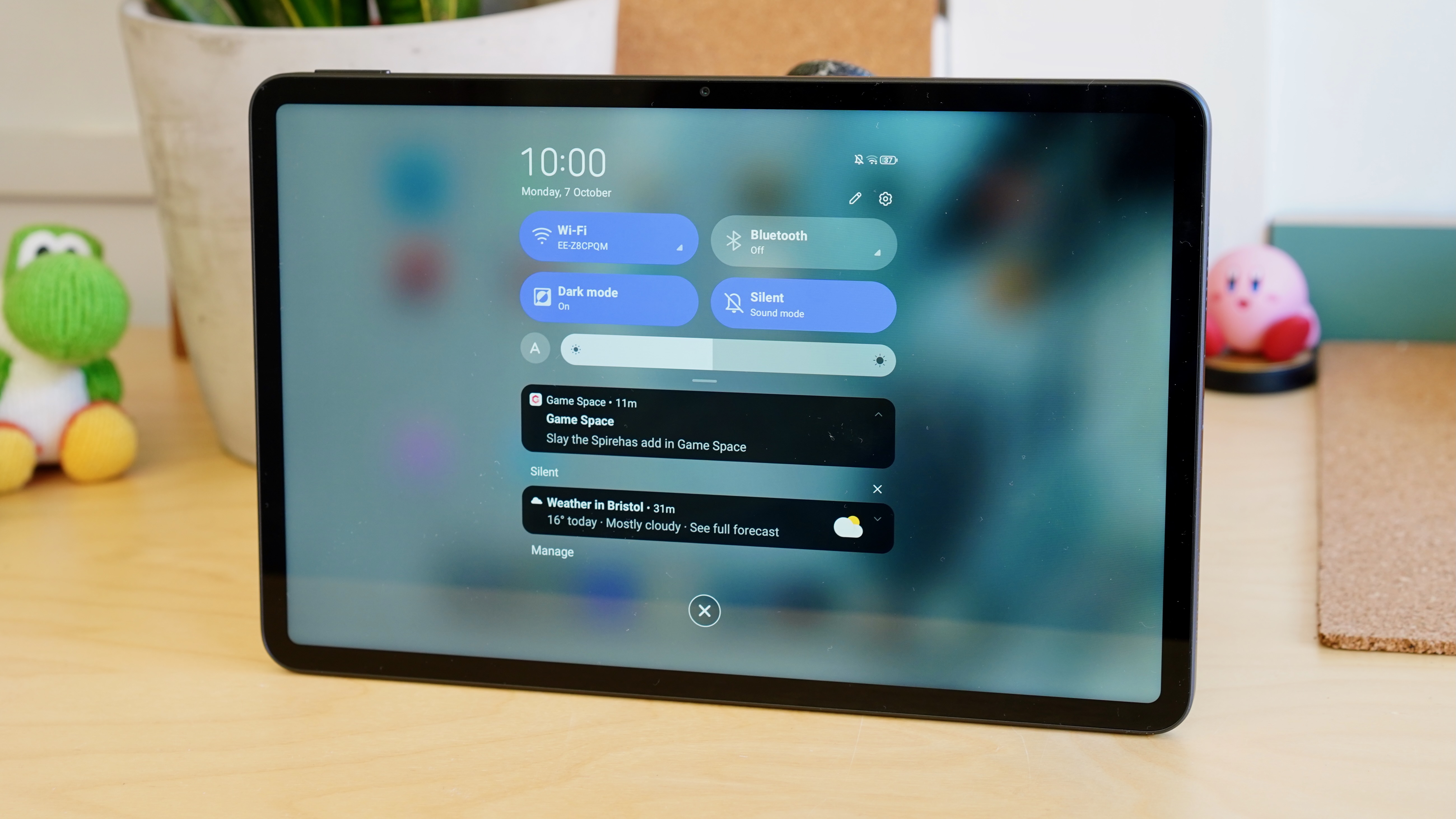
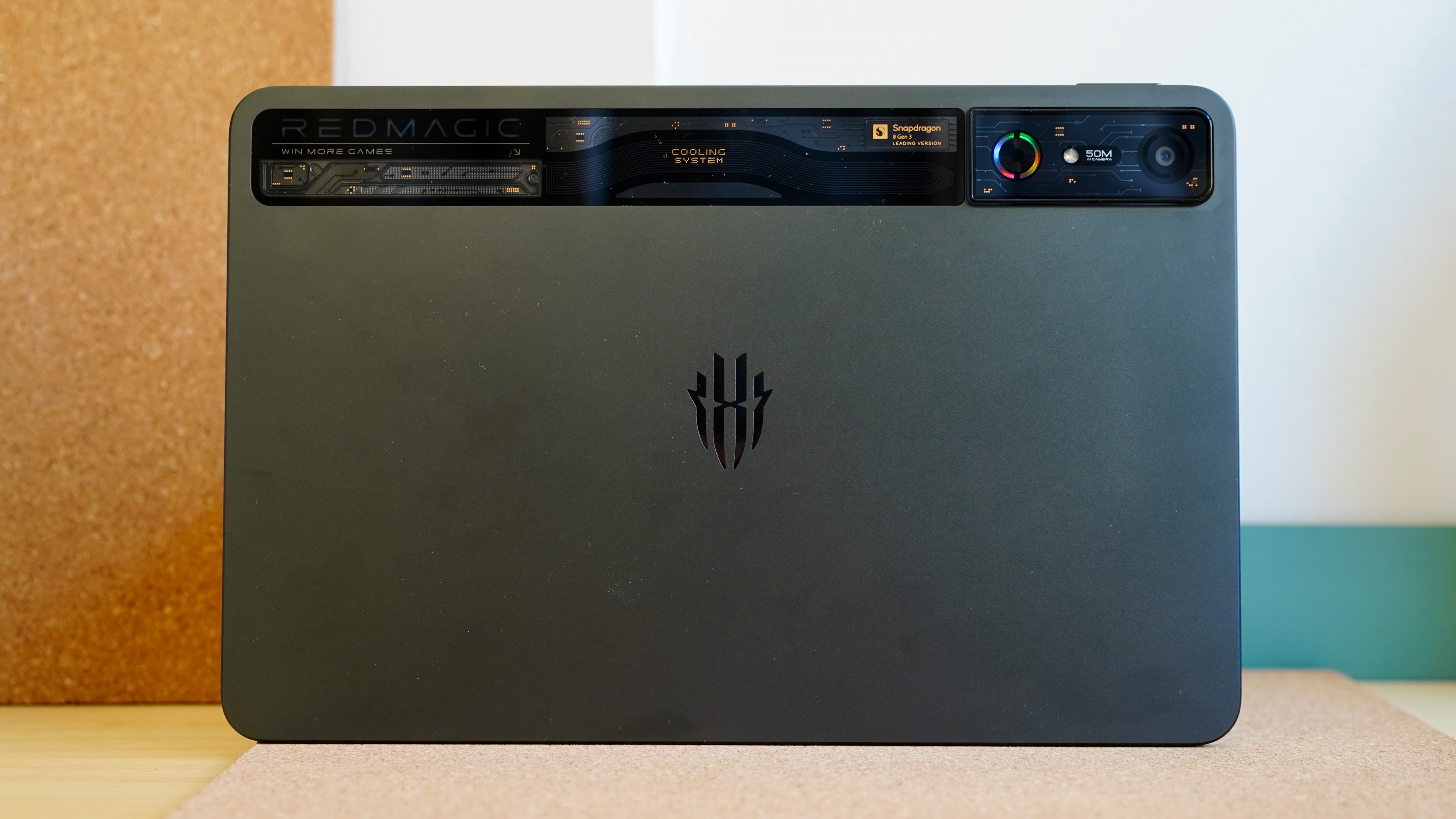
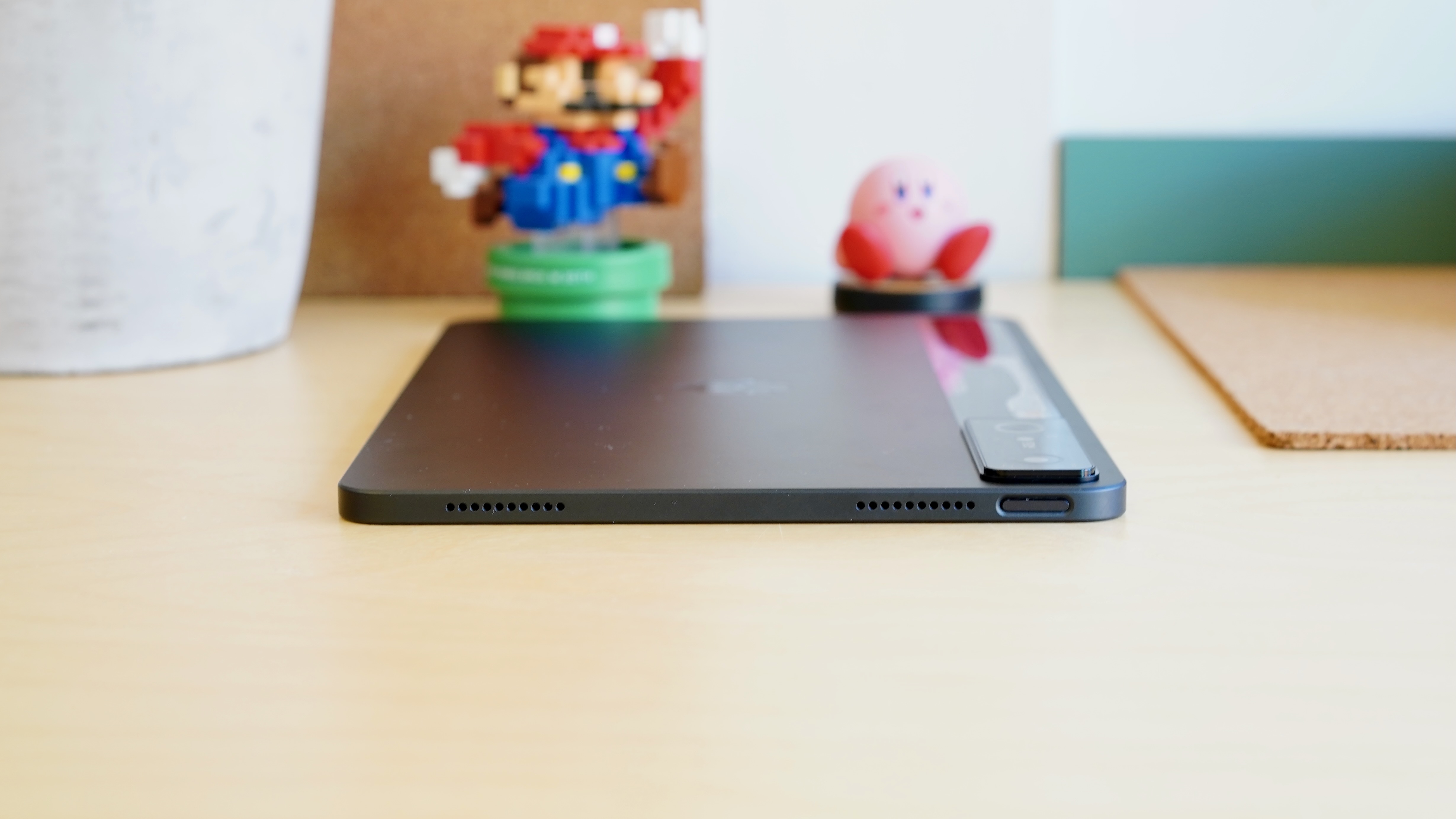
- Standard tablet shape and size with mostly metal body
- Signature semi-transparent window and RGB
- No 3.5mm headphone jack
- Would benefit from a bundled case or an integrated kickstand
Nubia’s Red Magic gaming phones are pretty chunky and angular, but the Nova’s design is more in line with what you’d expect from a regular tablet. It’s got that familiar flat-edged form factor, with an all-metal body and tightly rounded corners.
At 7.3mm, this isn’t the thinnest tablet on the market, but nor is it distractingly thick. By the same token, a weight of 530g is only a little heavier than the Samsung Galaxy S23 FE – though Nubia’s use of the word ‘dainty’ on its website is a bit of a stretch.
It’s only when you turn the Nova Tablet over and look at the back that it makes its gaming aspirations known. Nubia has applied its familiar semi-transparent finish to the thin band running between the camera module and the opposite edge of the tablet.
Those aren’t actual components you can see through the transparent material, just a fancy bit of circuitry accented by a gold color. You also get a little diagram sketching out the internal heat pipe, with the words ‘Cooling System’ helpfully printed on it. Nubia has also advertised the Snapdragon 8 Gen 3 Leading Version chip in a similar manner.
One genuine component on display is the cooling fan, which can be seen alongside the rear camera. This lights up in full RGB when in use, as do the words ‘Red Magic’ in the opposite corner. It’s not exactly subtle by normal standards, but relative to the wider gamer aesthetic, it’s all quite low-key.
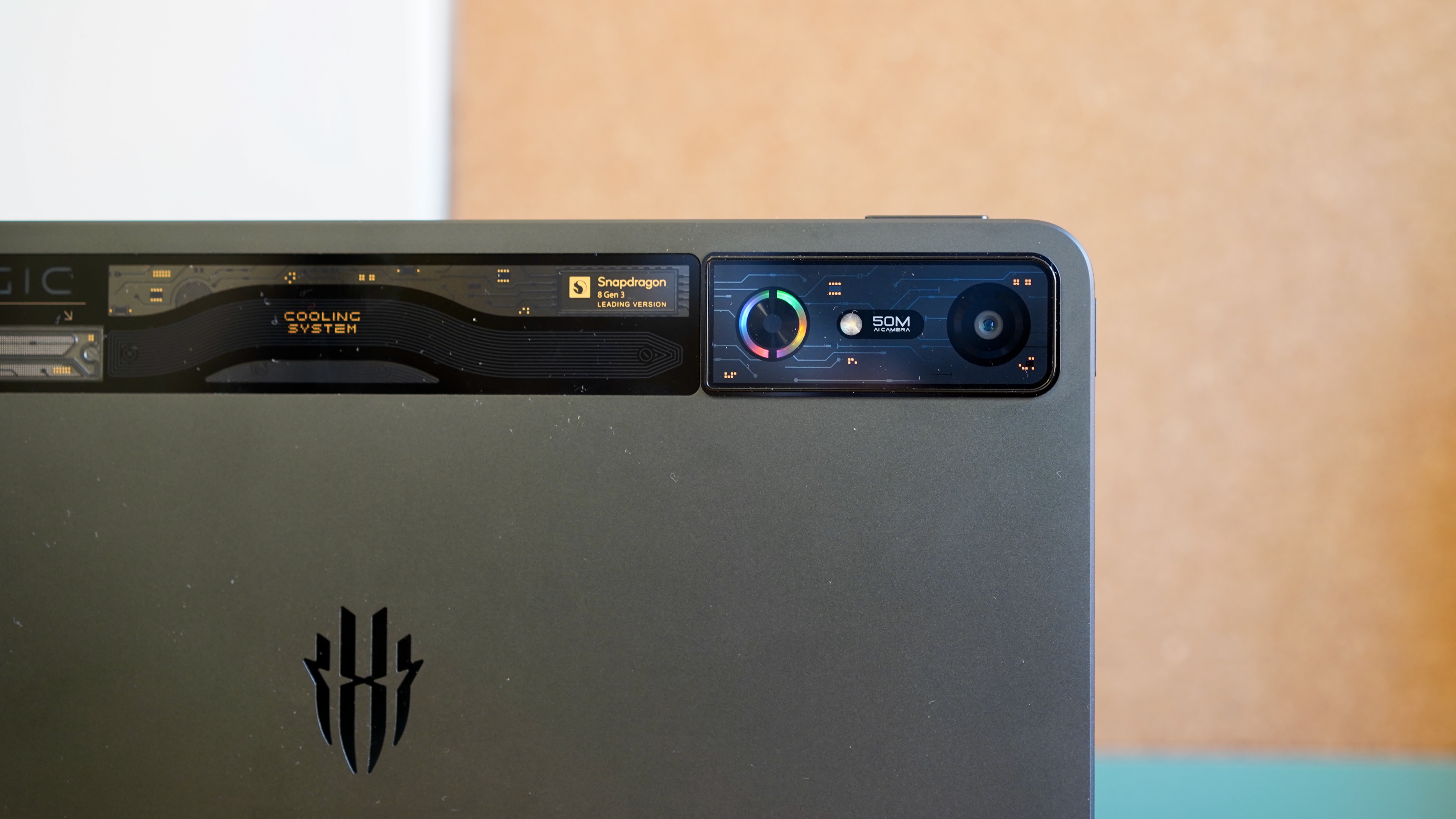
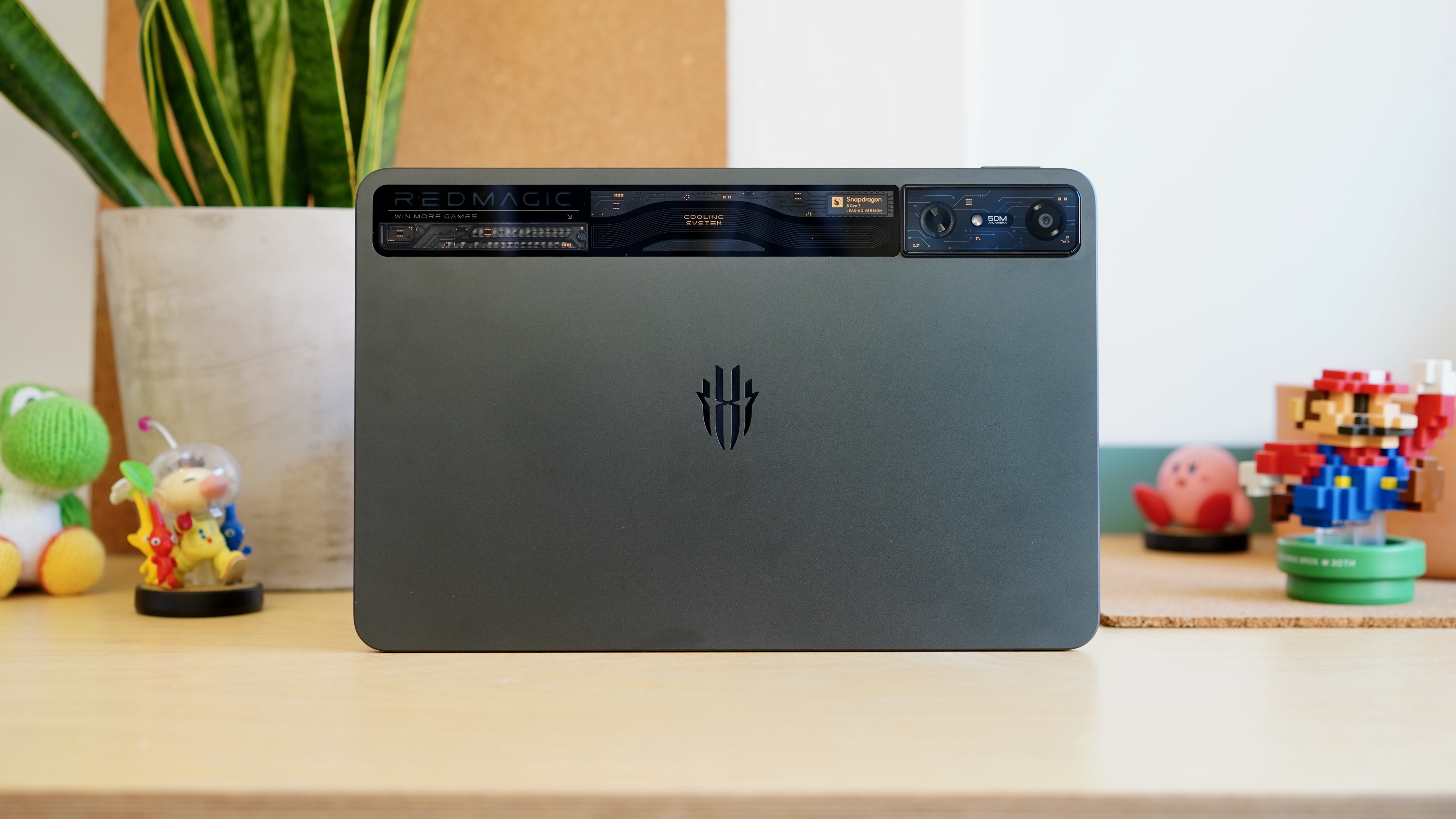
The tablet feels nice to handle, with a power key partly recessed on the left edge. This doubles as a fingerprint sensor, and it performs quickly and reliably. As always, it’s never quite as intuitive an experience as the same system on a smartphone, but there is also a basic facial recognition system in place.
I’m a little puzzled by the omission of a 3.5mm headphone jack on the Red Magic. Given the size and thickness of the tablet and its gaming focus, providing the means for latency-free personal audio would seem like an obvious step.
Indeed, it feels as if Nubia hasn’t quite hit upon the final form of the gaming tablet just yet. It makes sense that the Nova lacks the capacitive air trigger buttons of, say, the Red Magic 9S Pro, as gamers are going to be pairing it up with a Bluetooth controller rather than holding it like a phone (though the idea of some rear-mounted capacitive controls is an intriguing one).
With this in mind, I’d argue that having a case with a decent kickstand would be more than a nice extra here, entering into ‘must-have’ territory. The company assures me that an optional cover should be available for the Nova Tablet’s global launch (alongside a stylus), but I wonder if such a thing should come as standard, even if that meant a slightly higher asking price. This feels like the kind of tablet that would really benefit from one. There’s even a case to be made for the device itself having a built-in kickstand, rather like the Nintendo Switch.
- Design score: 3.5/5
Nubia Red Magic Nova Tablet review: display
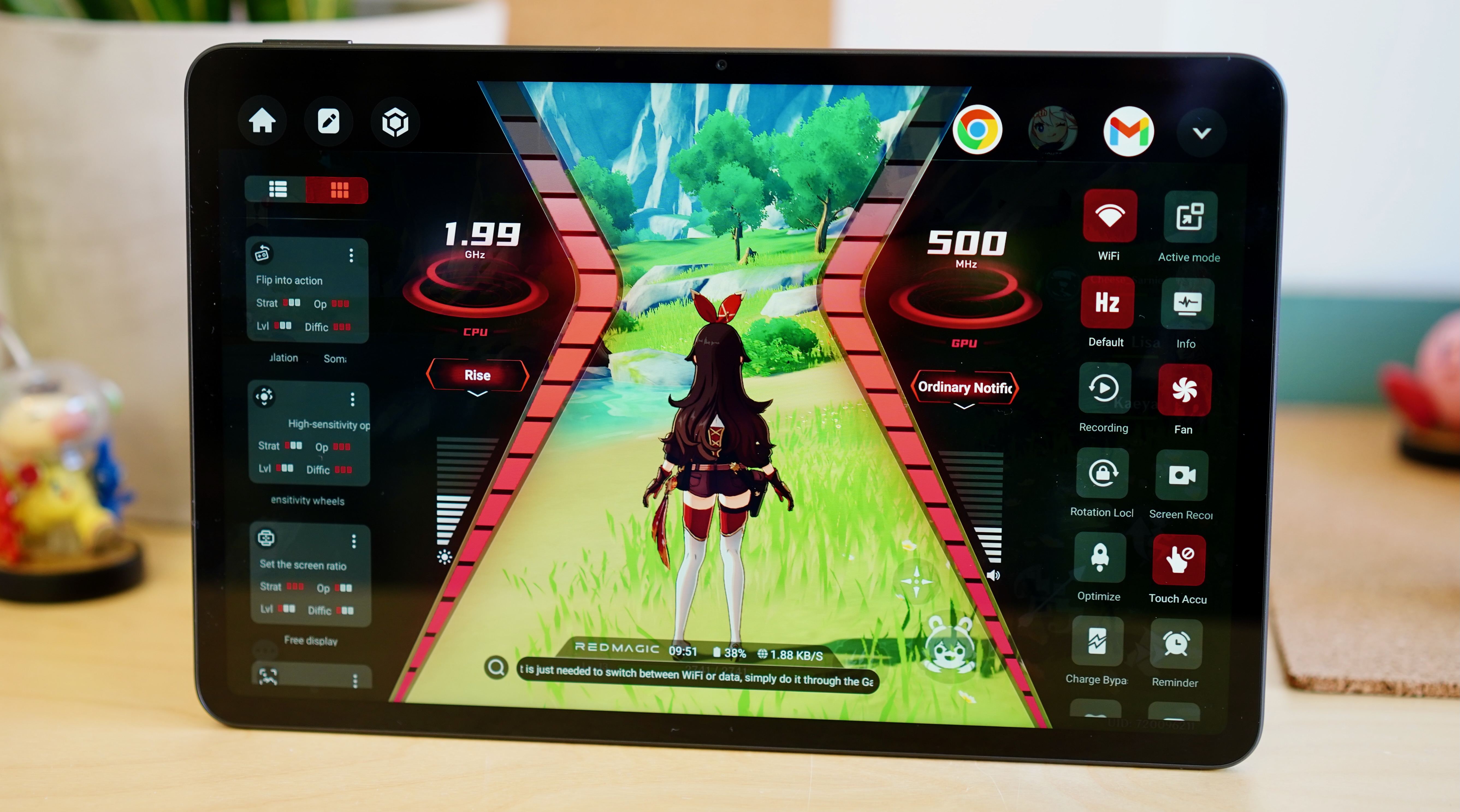
- 10.9-inch IPS LCD with 2.8K resolution
- Rapid 144Hz refresh rate
- 550 nits peak brightness
The Red Magic Nova Tablet employs a 10.9-inch display, which doesn’t feel as large as it once did. Not with the likes of the OnePlus Pad 2 and the Samsung Galaxy Tab S9 FE Plus bursting past the 12-inch mark.
It’s nice and sharp at 1800 x 2880 (Nubia calls this resolution ‘2.8K’), but the stand-out spec is a 144Hz refresh rate. The OnePlus Pad 2 also hits this mark, but it’s not what you’d call a typical refresh rate for a tablet. True, most mobile games won’t even hit the heady heights of 120Hz, but it’s nice to see a little headroom here nonetheless.
This refresh rate is paired with an 840Hz touch sampling rate, which means that it’s nice and responsive for those speedy multiplayer action games, should you not be using a paired Bluetooth controller.
Image quality is solid rather than spectacular. What with this being an IPS LCD, it lacks the pop and punch of an OLED, but that’s still not the kind of component you’ll typically find in a mid-priced tablet.
I would have liked the Nova to get a little brighter, though. Nubia cites a top brightness of 550 nits, which is fine. In practical terms, I frequently found myself cranking it up to the top brightness even when viewing the tablet indoors. This yielded a comfortable viewing experience, but a little more would have been welcome to help overcome those instances of glare or reflectiveness.
The screen is flanked by four symmetrically arranged speakers, with assistance from DTS-X Ultra Sound for a so-called “3D audio experience”. The resulting output is clear and loud, though we’re not talking about anything approaching iPad quality here which, given that price tag, is wholly understandable.
- Display score: 3.5/5
Nubia Red Magic Nova Tablet review: performance
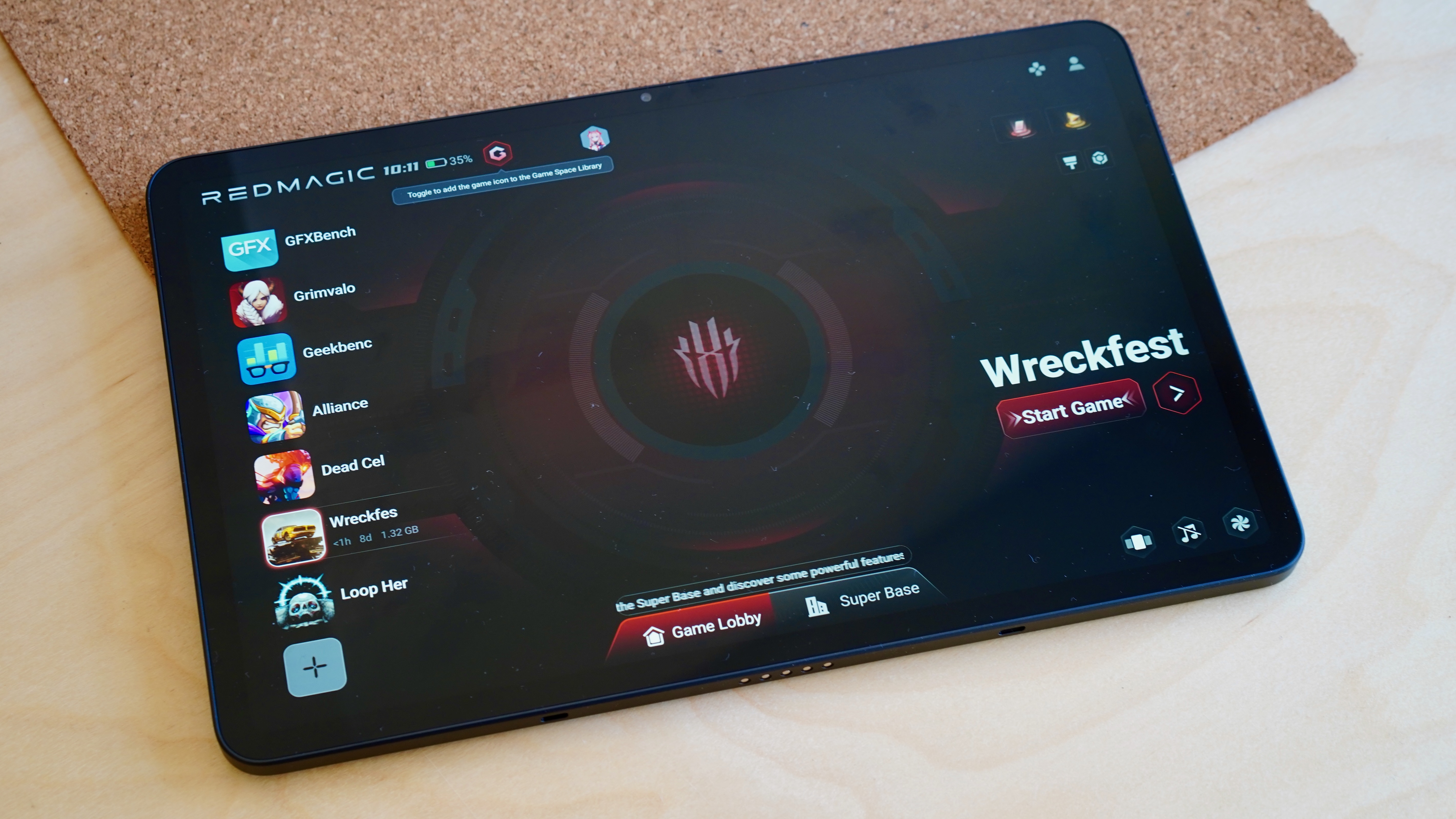
- Slightly faster Snapdragon 8 Gen 3 ‘Leading Version’ chip
- 12GB or 16GB RAM of LPDDR5X RAM
- 256GB or 512GB UFS 4.0 storage
Nubia has used the same Snapdragon 8 Gen 3 Leading Version chip here that powers its latest gaming smartphone, the Red Magic 9S Pro. This is a slightly overclocked version of the chip that runs most of the best Android phones in 2024. In other words, it’s one of the very best mobile chips on the market. In benchmarking terms, it’ll top or at least match anything running on Android, and you’ll need to invest in an Apple M2-powered iPad Air or an M4-powered iPad Pro to flat-out beat it.
General performance is unimpeachable, especially with either 12 or 16GB of LPDDR5X RAM backing it up. I’m testing the top spec, and I couldn’t make it sweat at all in general usage.
Of course, it’s not in regular scenarios that this tablet needs to be judged. This is a machine that’s built for gaming performance, and there isn’t much to worry about on that front either.
It’ll run both Genshin Impact and Wreckfest on maxed-out graphical settings with more or less perfect fluidity. That’s to be expected, because both of those games are a few years old now.
This speaks to a wider issue with dedicated mobile gaming devices. Mobile games themselves haven’t really pushed any technical boundaries for quite some time – at least not on Android – while mobile processors continue to get more and more powerful. The end result is that even a half-decent mid-range smartphone can play these more visually opulent games pretty well.
Where these gaming devices can set themselves apart is with sustained performance. Those top-notch off-the-shelf chips, when paired with bespoke cooling systems, can run faster for longer. To that end, Nubia has equipped the Red Magic Nova Tablet with a 20,000 RPM cooling fan.
Interestingly, you don’t get the accompanying open vent of the Red Magic smartphone series. This device instead uses the extra internal volume to create an extended but closed loop for cooling. Allied to that is a nine-layer cooling system, together with a 103mm-long 3D heat pipe.
It all sounds very impressive, but I was a little concerned about the performance stability of the Red Magic Nova Tablet. I ran a couple of 3D Mark Stress Tests, which simulate extended gaming performance through 20 consecutive minute-long graphical tests, with the tablet set to maximum gaming performance via the Game Space UI.
The results were mixed. The high-end Solar Bay Stress Test, in particular, ranged from 72% (fairly stable) to 26.5% (downright unstable), indicating that at least some degree of throttling is taking place over time. Switching between Rising and Balanced performance modes didn’t seem to make any difference here, either.
Even that top mark of 72% is far from blistering. It’s about what I got with the new Samsung Galaxy Tab S10 Plus – a capable performer for sure, but also not a gaming specialist with a particularly extensive cooling system. True, the Red Magic scored higher marks in general, but it was no more consistent with it. I should also note that the tablet would occasionally run uncomfortably hot by the end of these tests.
Interestingly, I found similarly less-than-stellar results in these tests on the Red Magic 9S Pro smartphone. No other tablet or phone series has such a meaty cooling system, so could this indicate some inherent thermal limitations with the overclocked Snapdragon 8 Gen 3 Leading Version?
We should always bring it back to the games regardless, and in real-world use, I didn’t run into any throttling issues when gaming for extended spells. After an hour of Wreckfest running on maximum graphical settings, I didn’t notice any big drop in frame rate.
Nubia has included a single 50MP camera on the rear of the phone. Suffice it to say, if no tablet is particularly great for taking pictures, then a mid-priced gaming tablet definitely shouldn’t be relied upon. It’s an appropriately bare-bones offering with no OIS, though it does at least support 4K video at 30fps.
The 20MP selfie camera is similarly limited, though at least Nubia hasn’t resorted to using a terrible under-display example, like with its smartphones. It’ll do fine for video calls.
- Performance score: 4.5/5
Nubia Red Magic Nova Tablet review: software

- Red Magic OS 9.5 on Android 14
- Ugly but functional UI
- Game Space UI lets you fine-tune your gaming setup
Software has always been a bit of a weakness with Red Magic devices, and that hasn’t changed with the transition to a larger tablet form factor. You’re getting the same Red Magic OS 9.5 that ran on the Red Magic 9S Pro smartphone, layered over the same Android 14 OS.
It’s not an attractive UI, despite Nubia having corrected a lot of its worst aspects such as clumsy screen-filling widgets and poorly translated text. It still feels a little unfinished, as evidenced by the odd syntax-mangling Game Space notification.
I’d rather not have to deal with Nubia’s custom feed to the left of the main home screen, which pulls in randomly chosen news stories, as well as the kind of game recommendations no self-respecting gamer would entertain.
On a similar point, there are two folders dedicated to Hot Apps and Hot Games on the home screen. Needless to say, none of the applications contained within look remotely ‘hot’.
With all that said, Red Magic OS 9.5 is perfectly smooth and functional. It runs at a consistently speedy lick, and doesn’t flood the home screen with third-party apps. Yes, there’s an extraneous web browser, and yes, Booking.com sneaks its way in again. But both are at least stashed away in the app tray.
There’s no physical switch to activate Nubia’s Game Space app here, unlike with the brand’s gaming phones. It’s still there, though, running along in the background while playing games, as well as being accessible from the drop-down notification menu.
You can use this app to tweak fan, CPU, and GPU settings, and to set up screen recording. You can also tweak screen sensitivity settings here, as well as play around with screen ratios, among other things. It’s a powerful tool for gamers looking to set their favored game up just so.
Ultimately, Red Magic OS 9.5 is a perfectly functional UI that’s easy enough to work with, if tough to truly love.
- Software score: 3.5/5
Nubia Red Magic Nova Tablet review: battery life
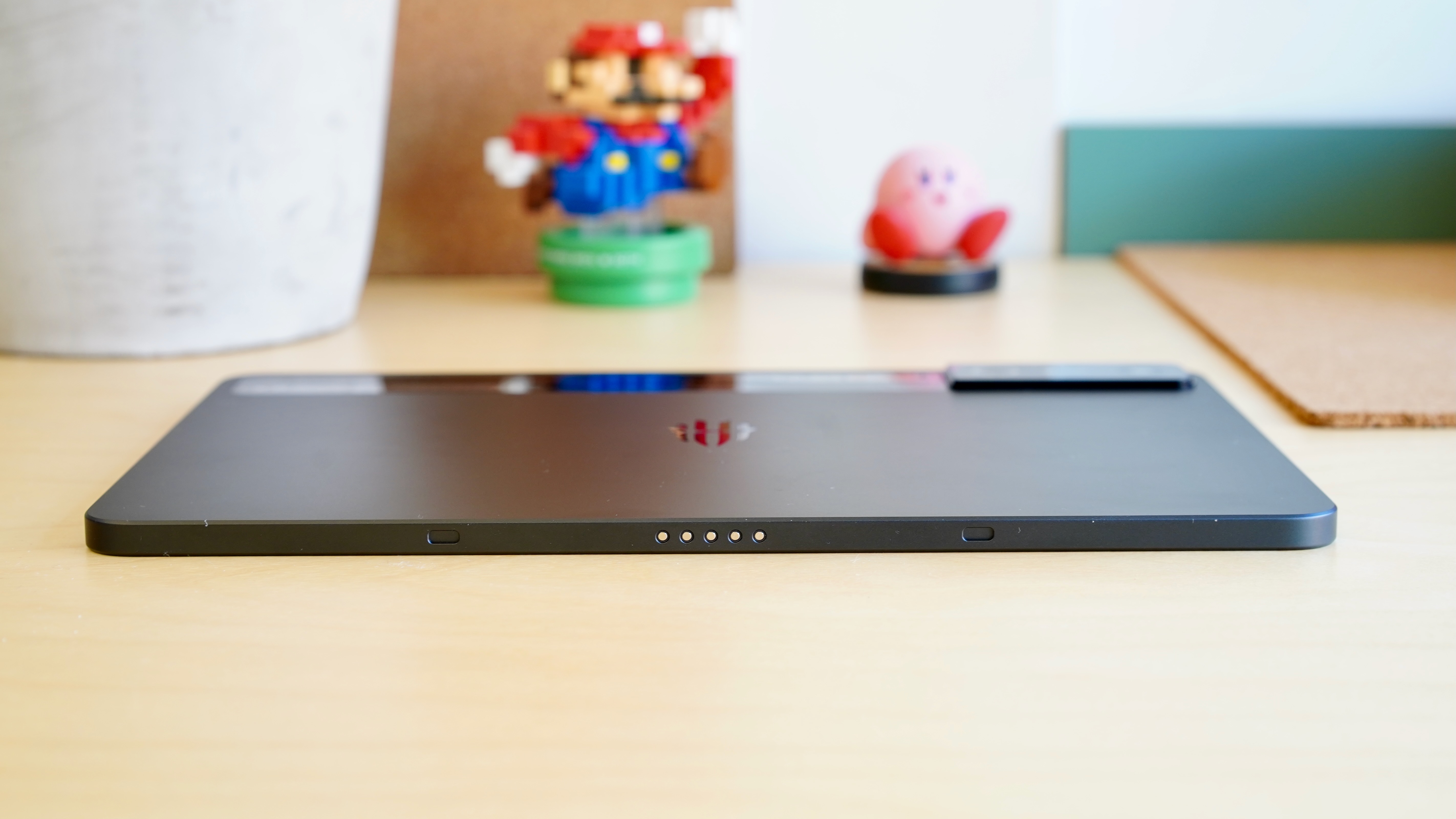
- 10,100mAh battery
- 10 hours of light gaming is possible
- 80W charging gets it from 0 to 100% in an hour
Nubia has equipped the Red Magic Nova Tablet with a monstrous 10,100mAh battery. That’s bigger even than that of the OnePlus Pad 2, which is a bigger device.
The official estimate for battery life here is up to 10 hours of uninterrupted gaming on a single charge. However, this would presumably be with the display refresh rate set to 60Hz, the brightness kept relatively low, and a fairly undemanding game being played. I suspect that this isn’t a particularly representative scenario for your average committed gamer.
For my own usage, with the brightness and refresh rate cranked up to maximum, I couldn’t get anywhere near that figure, regardless of the game. After 30 minutes of Warzone Mobile, the battery life had dropped by 17%, which maps out to around three hours of gaming.
Even with lighter fare, I couldn’t get close to that stated figure. After 30 minutes of Slay the Spire, that percentage had dropped by 12%, suggesting it would have lasted four hours.
In more normal usage, with a little light gaming, some web browsing, and light app usage, you could very well get through a full working day on a single charge.
With such a large cell, there’s always the worry about charging times. Nubia has mitigated this with 80W charging support, and it even includes the brick in the box.
I couldn’t quite match Nubia’s estimate of a full charge in 55 minutes, but it still only took a smidgen over an hour in my testing. A quick 15-minute splash got it to 36%.
- Battery score: 4/5
Should I buy the Nubia Red Magic Nova Tablet?
Buy it if...
You want the fastest tablet possible for less than $500/£500
In terms of performance bang for your buck, the Red Magic Nova Tablet beats all comers.
You’re a committed mobile gamer
The Nova Tablet is set up for gaming, with top-level performance and a suite of game-enhancing tools.
You dig the gamer aesthetic
Nubia hasn’t gone too hard on the gamer aesthetic, but you still get a ‘cool’ semi-transparent motif on the back with some RGB lighting.
Don't buy it if...
You’re a fan of clean UIs
Nubia’s custom software is a little on the ugly side, straying too far from stock Android.
You want the ultimate gaming tablet experience, money no object
It might be fast and gaming-focused, but an iPad Pro remains a better gaming tablet overall.
You want a genuinely mobile gaming device
The Red Magic Nova Tablet isn’t too big or heavy, but it’s still not ideal for gaming on the move.
Nubia Red Magic Nova Tablet: also consider
OnePlus Pad 2
The OnePlus Pad 2 is perhaps the most direct competitor here, with its £549/£499 pricing, Snapdragon 8 Gen 3 power, and larger 12.1-inch 144Hz display.
iPad Air (2024)
The latest 11-inch iPad Air is more expensive than the Nova Tablet at $599 / £599, and its 60Hz display isn’t massively gamer-friendly, but it’s more powerful and has access to a bigger library of high-end games.
Samsung Galaxy Tab S9 FE
The Galaxy Tab S9 FE is similarly priced and a classier all-round operator, but it lacks the Nova Tablet’s gaming chops thanks to inferior power and a 90Hz display.
How I tested the Nubia Red Magic Nova Tablet
- Review test period = 1 week
- Testing included = Everyday usage, including web browsing, social media, photography, video calling, gaming, streaming video, music playback
- Tools used = Geekbench 6, GFXBench, 3DMark, native Android stats, bundled Nubia 80W power adapter
First reviewed: October 2024
0 comments:
Post a Comment